How Do I Find Where To Find Cook County Public Records?
Individuals can find Cook county public record by accessing the Illinois courts public database or by contacting the Cook County court clerk directly.5,1
 Written by Background Check Repair
Written by Background Check Repair
Criminal Records | April 29, 2024
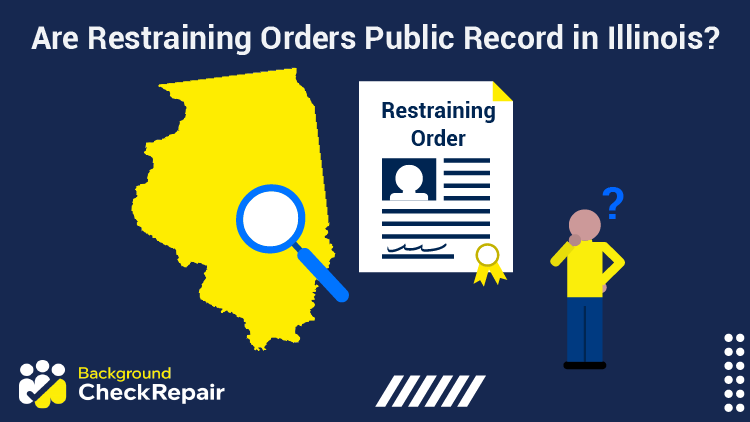
Table of Contents
Are restraining orders public record in Illinois? What is the IL protection order search and can anyone use it?
In Illinois, whether or not a restraining order is a public record will depend on the court where the order was filed. In general, restraining orders that are filed in civil or family courts remain under a seal, and are not part of the public record.
However, that doesn’t mean they aren’t searchable.
Most states, like Illinois, have a protection order search that allows law enforcement to see any court orders filed against a person. The only thing is that this search portal is not available for use to the general public.
However, that doesn’t mean that all restraining orders won’t show up on a criminal history check.
The question, are restraining orders public record in Illinois is a little complicated. This complete guide explains when a restraining order will show up on a public records search in Illinois, and what people can do to remove them from the record.
When asking are restraining orders public record in Illinois, the first thing that individuals should know is where the order in question was filed.
In most cases, restraining orders are seen as a civil or family issue and are thus filed in a civil or family court. This poses an interesting obstacle when it comes to actually obtaining the records.
Although the Freedom of information act requires that all court records be publicly available, there are exceptions to this that directly affect the availability of civil and family court records.7
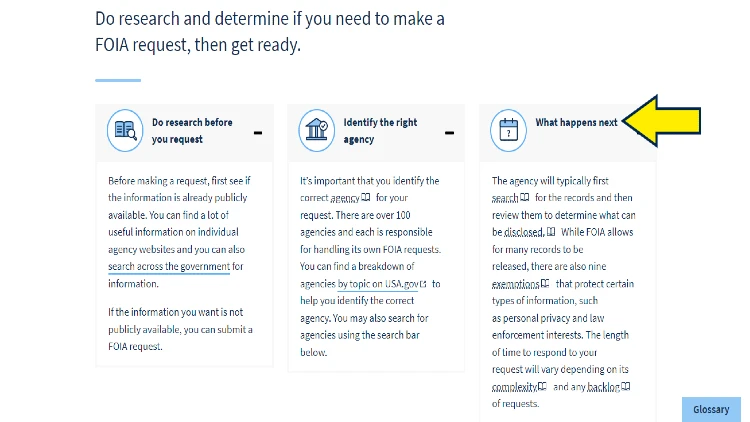
When conducting a Freedom of Information Act request, the time period for waiting can be a few weeks to many, many months. It all depends on the types of government records being requested.
Basically, a judge is able to seal court records if the information is not considered relevant to the public and if the information could potentially be harmful to those involved if it is made a part of the public record.
This almost never applies to criminal records because criminal records could be considered an issue of public safety, however, it does apply to civil and family court records.
Thus the vast majority of civil and family court records are sealed when the case is completed.
Since many restraining orders are filed by people who have family connections to the abuser, this means that only Justice Department and law enforcement personnel can access them.
When filing an order of protection, Illinois rules are somewhat different than many states.
While most states use the terms restraining order and order of protection interchangeably, Illinois has specific legal definitions for both of these terms. The state also uses a different additional term, a stay away order, whereas most states simply use ‘restraining order.’6
In Illinois, an order of protection is used to keep one individual away from another, in the same way, that the term ‘restraining order’ is normally used, however, an order of protection can only be filed in situations of domestic violence.3
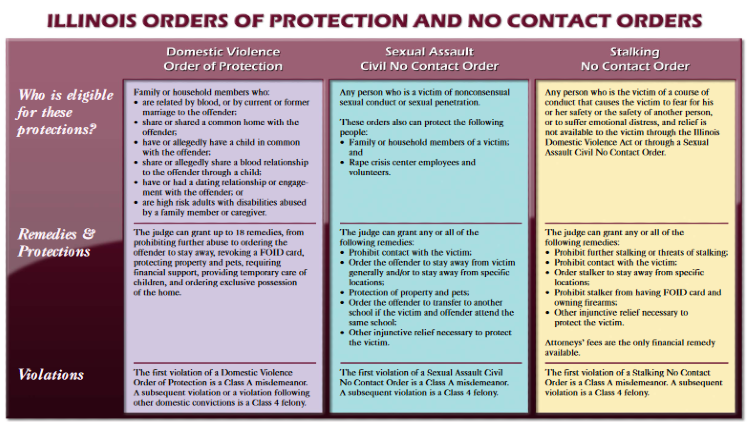
Illinois has specific definitions of restraining orders, no contact orders, and orders of protection.
Normally restraining order is used to describe an order that keeps one individual away from another, regardless of the circumstances. Restraining orders can be used to refer to domestic issues, disputes involving neighbors and coworkers, or issues involving stalking.
However, in Illinois, the term restraining order is not used for legal purposes. Instead, a domestic issue that would normally require a restraining order is known as an ‘order of protection’ and non-domestic issues that would involve a restraining order are referred to as ‘stay away orders.’
This may sound confusing, but the important thing to remember is that there is very little difference in the execution of these two orders. Both are used to keep one individual away from another as well as limit or prohibit contact between the individuals.
As far as the exact rules for an order of protection are concerned, individuals should expect the same general rules as every other state. Individuals must follow the terms of the order involving how far the individual must stay away from the petitioner’s home, place of work, school, etc., and they are also prohibited from contacting the individual in any way in most cases.
Keep in mind that many orders will have rules that are specific to the situation, so not all orders of protection will have the same exact rules.
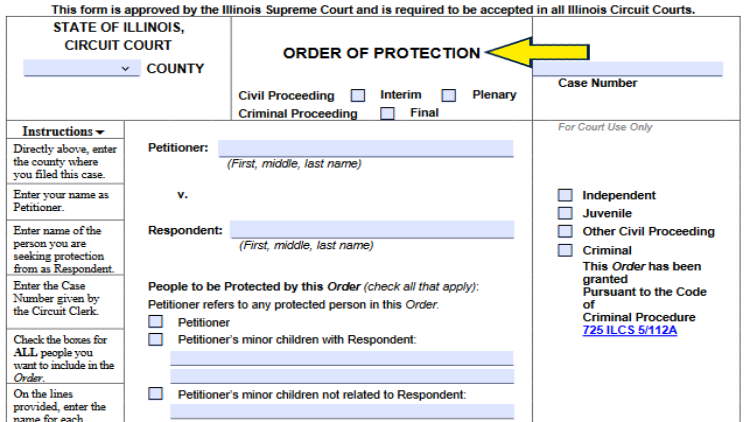
Filing for an order of protection in Illinois can be performing using online documents and requests forms.
Finally, the punishment for violating both of these orders is largely the same. Violating an order of protection and violating a stay-away order both carry a charge of criminal contempt.
The charge can be a misdemeanor or a felony depending on the circumstances and a variety of other factors.
Individuals can familiarize themselves with the differences between the orders such as when they are used and who is eligible to file for them, by looking at the Illinois Attorney General’s poster on the issue.4
Many individuals will be concerned about, does a restraining order goes on your personal record, possibly because they are worried it will impact an upcoming background check. As long as the restraining order was filed in a civil court, then individuals will have nothing to worry about as civil records are usually sealed and will not appear on the individual’s background check.
Even in situations where it is unclear if the record was sealed or not, it is still fairly unlikely for it to show up on a background check. This is because background checks usually examine an individual’s criminal history by looking at criminal court records for the counties the individual has lived in during the last several years and will rarely check civil court records at all.
However, if the order was filed in a criminal court then the information is almost certain to appear on the individual’s record as well as any background checks that they may undergo.
In addition, if the order was filed in relation to a criminal act and an arrest, these incidents will appear on a criminal history check.
Background check agencies will be able to see the record of the restraining order itself, as well as the related criminal charges which resulted in the order being filed.
Those wondering how long a restraining order stays on your record will need to look into their state laws regarding background checks to get a better idea of what to expect. The only federal laws that deal with criminal history records are those outlined by the FCRA.11
The FCRA does not have any limits when it comes to how long criminal records can remain on an individual’s record so in the vast majority of states an individual’s criminal record, regardless of the crime, will stay on their record forever.
Although more and more states are adopting the 7-year rule, which prevents criminal history information from appearing on a background check if the information is older than 7-10 years old, the majority of states still rely solely on the FCRA for background check laws.
Illinois does not have any such laws and thus, a restraining order will remain on the individual’s record forever.
The best way to know for sure if there is a restraining order on your record is to perform a restraining order background check on yourself.
Performing a background check on yourself is extremely easy and will allow individuals to see the same information that an employer might see during a pre-employment background check as well as help you how to fix errors on your background check if it is incorrect.
The easiest way to perform a background check on yourself is by using the search bar at the top of this page to perform a public record search on the name entered. This will give individuals an idea of what appears on a background check for employment, whether restraining orders or any other record related to crimes.
There is also the option to hire a private background check service to perform the check.
Most online background check agencies will require individuals to sign up for a month-long subscription in order to perform a search, however, there are several that offer free trials that individuals can take advantage of to perform a single search.
Finally, the most thorough check available is the FBI’s identity history summary check.2 This is a fingerprint-based federal background check that individuals can pay to have performed on themselves. This will be the most intensive check that is currently available and is recommended for individuals who want to be absolutely certain about their criminal history.
Aside from the public records search box at the top of the website, there are third-party background check service providers that offer to conduct a background check for a fee. Some even offer a 7-day free trial background check.
Those wondering does a harassment order goes on your personal record, will be pleased to learn that harassment orders, just like restraining orders will not appear on an individual’s record.
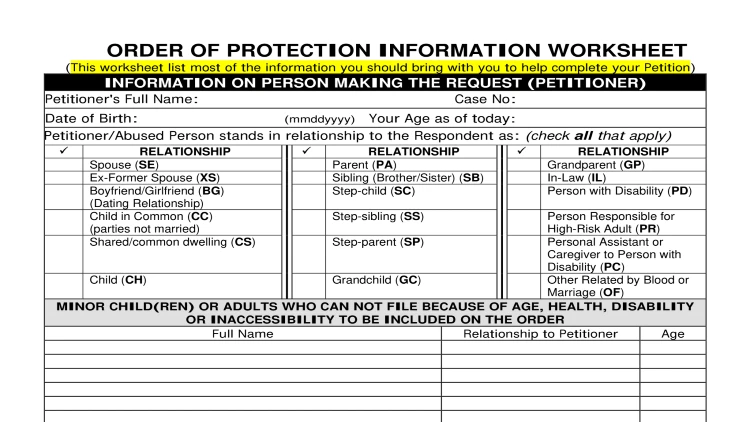
Petitioners can fill out an Order of Protection Information Worksheet which will help list all the information on incidents leading to the petition.
Harassment orders are filed in civil or family court and thus will not appear on the individual’s criminal record since there were no criminal charges involved.
When it comes to, does a temporary restraining order remain on your record, the answer is almost always no.
Temporary restraining orders are used almost exclusively in civil court and thus the records of the order will be sealed when the case is completed.
But, of the temporary order was issued as a result of a criminal act, it will show up.
Knowing how to look up public records is something that all individuals should know how to do, regardless of if they have a criminal history or not. These days, finding public records is easier than ever and can often be done online.
The main thing that individuals should know about public records, in general, is that there is not a single database that houses all cities’ or states public records. Instead, individuals will need to identify which agency maintains the records and reach out to that agency directly.
When in doubt, individuals should contact their local county clerk, who is in charge of most of the public records for their county.
Knowing how to look up court records and other public records is the best way for individuals asking, are restraining orders public record in Illinois, to know for sure if their records are public or if they have been sealed.
Although most states require that individuals contact their local court directly in order to obtain documents and make records requests, the Illinois courts have implemented a statewide court record database that can be accessed from anywhere.5
In order to perform an Illinois court records search by name, individuals will need to know the court where the case was filed at, in order to perform their search.
Searches can be completed using the name of one of the individuals that are named in the case, however having additional information such as the case number can also help.
The Illinois Secretary of State website has an extremely useful tool for searching numerous databases allowing for a single website where individuals can perform an Illinois public records search for a variety of different records.9
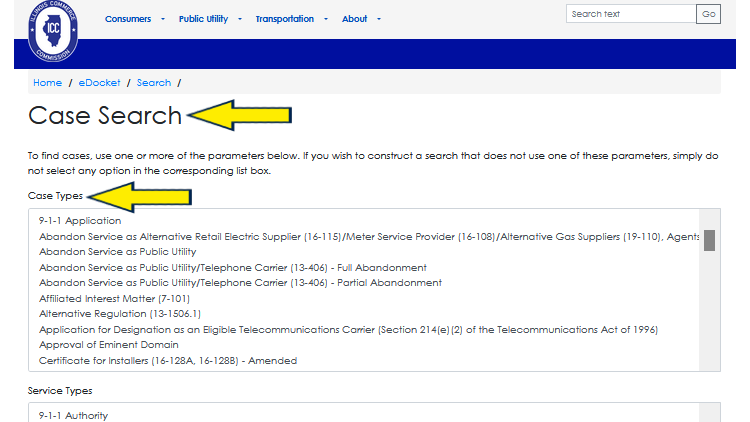
Case search portals in Illinois access digital databases of criminal and civil court records. However, only the parties involved (and their legal representation) may access civil and family court records.
Individuals can simply access the website and use the list of databases to find the information they are looking for. Keep in mind that obtaining a certified copy of any public record usually requires a small fee.
Illinois public criminal records are available in a few different places. The most direct method to obtain criminal records is to go through the court clerk at the court where the records are being held or through the online court records database.8
Remember, individual courts will only have their own records available and will not have court records of cases that were held in courts elsewhere in the state.
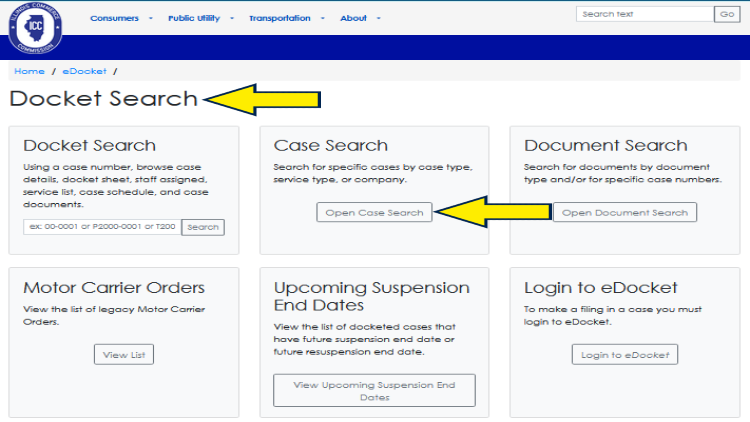
With a case number, anyone can access the court documents related to that case.
Individuals who are looking for their own criminal records in the state can visit the local police department which can access an individual’s entire criminal record for the state.
Individuals trying to perform a circuit court case lookup might be struggling to find where these records are held. Circuit court cases are held at the court where the case was filed as well as on the aforementioned Illinois courts online database in most cases.5
Individuals who are having difficulty locating certain records should contact the county court clerk directly.
Although there is no designated Illinois court date lookup, finding the court date via court records is fairly easy.
Individuals can simply contact the county clerk where the case is being held or was held to find out information. If the date has already occurred, individuals may need to request a copy of the court records.
Local and state laws can make the issue of, are restraining orders public record in Illinois, a confusing one. Individuals should know that unless the restraining order accompanied criminal charges and was filed in criminal court, it should not appear on the public record or on any background check the defendant undergoes.
Being unprepared for a restraining order is a dangerous position to be in.
Although legal counsel is ideal, not everyone will have this option available. If this is the case, individuals should make sure they have a solid understanding of local laws and can comfortably answer questions like, are restraining orders public record in Illinois?
Individuals can find Cook county public record by accessing the Illinois courts public database or by contacting the Cook County court clerk directly.5,1
Individuals can perform a court case search in Cook county Illinois, by accessing the county’s online court database or by contacting the court clerk directly via phone, email or in person.1
Illinois public court records will be held at the court where the specific case was filed. However Illinois also has an online court case search that individuals can use to search and requests records for specific cases without having to contact the court clerk.5
Individuals can perform a country court case lookup in Illinois by contacting the court clerk where the case was filed.
A restraining order is only public record if it was filed in a criminal court, however most are filed in civil court which means the majority of restraining order records are sealed and not a part of the public record.
CCAP is the Illinois Department of Health’s Child Care Assistance Program and is used to assist low-income families by offering affordable child care services.10
Individuals can always request copies of court court records of cases they were involved in through the court clerk where the case was held.
Individuals can perform a simple case search in Illinois through the state court record database. Or by contacting the court clerk at the court where the case was filed.5
Illinois court cases are held in the courts where they were filed and can be requested by contacting the court clerk.
Judici is a third party company that offers court record services to attorneys and legal professionals across the state of Illinois.
Individuals can use the Illinois online court case lookup to find and request court records including civil records, circuit court records and criminal records.5
CCAP is a division of the Illinois Department of Health. Since they are a public agency, they are subject to the freedom of information act so individuals should be able to contact them with any records request that they may have.
1Cook County Government. (2023). Court Records and Archives. Cook County Government Illinois. Retrieved January 3, 2023, from <https://www.cookcountyil.gov/service/court-records-and-archives>
2Federal Bureau of Investigation. (2023). Identity History Summary Checks (Rap Sheets). Federal Bureau of Investigation. Retrieved January 3, 2023, from <https://www.fbi.gov/how-we-can-help-you/more-fbi-services-and-information/identity-history-summary-checks>
3Illinois Attorney General. (2023). Illinois Domestic Violence Act: Orders of Protection. Illinois Attorney General. Retrieved January 3, 2023, from <https://illinoisattorneygeneral.gov/women/ordersofprotection.html>
4Illinois Attorney General. (2023). Illinois Orders of Protection and No Contact Orders. Illinois Attorney General. Retrieved January 3, 2023, from <https://illinoisattorneygeneral.gov/women/OrdersofProtectionPoster.pdf>
5Illinois Courts. (2023). Helpful Resources for the Public. Illinois Courts. Retrieved January 3, 2023, from <https://www.illinoiscourts.gov/public>
6Illinois General Assembly by the Legislative Information System. (2023). (740 ILCS 22/) Civil No Contact Order Act. Illinois General Assembly. Retrieved January 3, 2023, from <https://www.ilga.gov/legislation/ilcs/ilcs5.asp?ActID=2491&ChapterID=57>
7Office of Information Policy (OIP) U.S. Department of Justice. (2023). Freedom of Information Act Homepage. Freedom of Information Act. Retrieved January 3, 2023, from <https://www.foia.gov/>
8State of Illinois. (2023). Case Search. Illinois Commerce Commission. Retrieved January 3, 2023, from <https://icc.illinois.gov/docket/search/cases>
9State of Illinois. (2023). Find Public Records. Illinois.gov. Retrieved January 3, 2023, from <https://www.illinois.gov/services/service.public-records.html>
10Illinois Department of Human Services. (2023). Child Care Assistance Program (CCAP). Illinois Department of Human Services. Retrieved January 3, 2023, from <https://www.dhs.state.il.us/page.aspx?item=30355>
11United States Government. (2023). Fair Credit Reporting Act. Federal Trade Commission. Retrieved January 3, 2023, from <https://www.ftc.gov/legal-library/browse/statutes/fair-credit-reporting-act>
We use cookies to ensure that we give you the best experience on our website. If you continue to use this site we will assume that you are happy with it